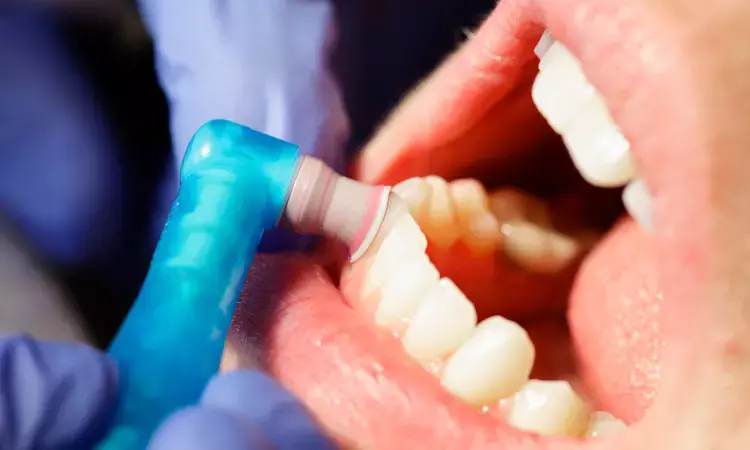- Home
- Medical news & Guidelines
- Anesthesiology
- Cardiology and CTVS
- Critical Care
- Dentistry
- Dermatology
- Diabetes and Endocrinology
- ENT
- Gastroenterology
- Medicine
- Nephrology
- Neurology
- Obstretics-Gynaecology
- Oncology
- Ophthalmology
- Orthopaedics
- Pediatrics-Neonatology
- Psychiatry
- Pulmonology
- Radiology
- Surgery
- Urology
- Laboratory Medicine
- Diet
- Nursing
- Paramedical
- Physiotherapy
- Health news
- Fact Check
- Bone Health Fact Check
- Brain Health Fact Check
- Cancer Related Fact Check
- Child Care Fact Check
- Dental and oral health fact check
- Diabetes and metabolic health fact check
- Diet and Nutrition Fact Check
- Eye and ENT Care Fact Check
- Fitness fact check
- Gut health fact check
- Heart health fact check
- Kidney health fact check
- Medical education fact check
- Men's health fact check
- Respiratory fact check
- Skin and hair care fact check
- Vaccine and Immunization fact check
- Women's health fact check
- AYUSH
- State News
- Andaman and Nicobar Islands
- Andhra Pradesh
- Arunachal Pradesh
- Assam
- Bihar
- Chandigarh
- Chattisgarh
- Dadra and Nagar Haveli
- Daman and Diu
- Delhi
- Goa
- Gujarat
- Haryana
- Himachal Pradesh
- Jammu & Kashmir
- Jharkhand
- Karnataka
- Kerala
- Ladakh
- Lakshadweep
- Madhya Pradesh
- Maharashtra
- Manipur
- Meghalaya
- Mizoram
- Nagaland
- Odisha
- Puducherry
- Punjab
- Rajasthan
- Sikkim
- Tamil Nadu
- Telangana
- Tripura
- Uttar Pradesh
- Uttrakhand
- West Bengal
- Medical Education
- Industry
Automated polishing best for reducing surface roughness of polymethyl methacrylate based resins

South Africa: A recent investigation published in the European Journal of Dentistry elucidated the automated polishing system as the most reliable, valuable, and effective polishing method in reducing the surface roughness of PMMA (polymethyl methacrylate) based resins.
Polymethyl methacrylate (PMMA) is the most popular denture base material compatible with the oral environment. Maintaining a smooth and polished surface is the prerequisite for maintaining good oral health and preventing bacterial colonization.
Tupinamba et al. said, "Correct polishing prevents bacterial retention and plaque build-up." A dental prosthesis's quality and intra-oral success depend on a well-polished and smooth denture surface. The surface roughness of the PMMA prosthesis should not be more than 0.2 µm after polishing. This value is exceeded in hand polishing. Using eggshell powder as an alternative abrasive material in hand and automatic polishing of denture base materials is an excellent option to maintain this threshold limit value.
The surface roughness of PMMA resins depends on the intrinsic properties of materials, the type of polishing method, and the physical abilities of the operator. Corsalini et al. argued that the automated polishing system should be adopted instead of the traditional polishing methods.
Considering this, Dr. Stanley Chibuzor Onwubu and Dr. Phumlane Selby Mdluli from the Department of Chemistry at the Durban University of Technology aimed to study the influence of manual skills, polishing method, and abrasive materials on the surface roughness of dental prostheses. The modes of measurement were profilometry and statistical analysis. The Ra value related to the average peak and valley distance quantitatively described the surface roughness in vitro.
The key points of the study are:
- Hand and automatic polishing machines were used to polish 40 PMMA specimens.
- 30 specimens were hand-polished with eggshell powder and pumice at 1,500 rpm for 2 minutes by the skilled dental technician or operator.
- The operator automatically polished 10 specimens.
- A profilometer determined the average surface roughness (Ra) after polishing.
- The Ra values for the hand-polished and all polished specimens were analyzed using paired sample testing and a one-way ANOVA.
- The differences between the abrasive materials and the polishing system were determined using the Bonferonni tests, and the p-value was 0.05.
- There were significant variations in the Ra values across the three operators with a p-value of < 0.001.
- The automated technique created a smoother surface compared to the traditional technique with a p-value of 0.001.
- The Ra value was greatest in specimens polished traditionally using pumice with a value of 0.20 µm.
- The lowest Ra value was lowest in specimens polished mechanically with eggshell powder with a value of 0.04 µm.
- The automated polishing system was the most effective polishing method when the Ra values were connected to the level of smoothness.
The authors said, "The lower Ra recorded with eggshell powder shows that the material will produce a highly polished surface which makes it suitable abrasive material in both hand and automatic polishing of denture base materials."
The final words of conclusion by the authors were," Our study is helpful for dental technicians to select abrasive materials and the polishing system to produce clinically acceptable results."
The authors received financial support from the National Research Foundation of South Africa.
Further reading:
• Comparative Analysis of Abrasive Materials and Polishing System on the Surface Roughness of Heat-Polymerized Acrylic Resins. Eur J Dent 2022; 16(03): 573-579
BDS, MDS in Periodontics and Implantology
Dr. Aditi Yadav is a BDS, MDS in Periodontics and Implantology. She has a clinical experience of 5 years as a laser dental surgeon. She also has a Diploma in clinical research and pharmacovigilance and is a Certified data scientist. She is currently working as a content developer in e-health services. Dr. Yadav has a keen interest in Medical Journalism and is actively involved in Medical Research writing.
Dr Kamal Kant Kohli-MBBS, DTCD- a chest specialist with more than 30 years of practice and a flair for writing clinical articles, Dr Kamal Kant Kohli joined Medical Dialogues as a Chief Editor of Medical News. Besides writing articles, as an editor, he proofreads and verifies all the medical content published on Medical Dialogues including those coming from journals, studies,medical conferences,guidelines etc. Email: drkohli@medicaldialogues.in. Contact no. 011-43720751


